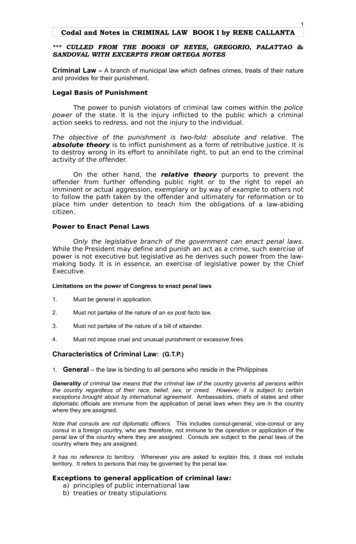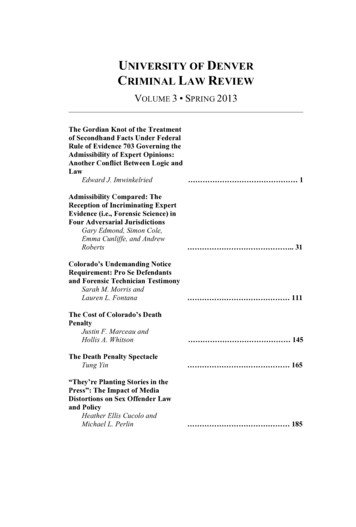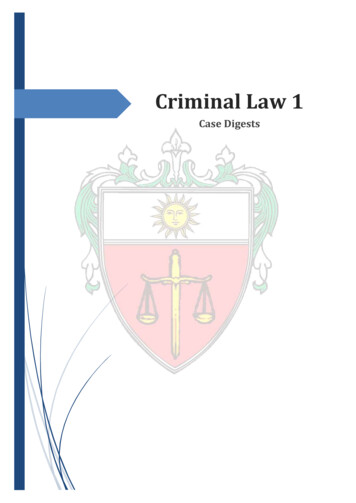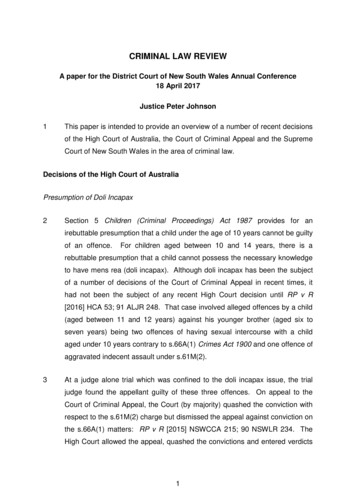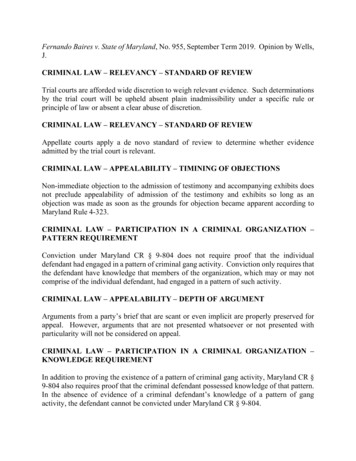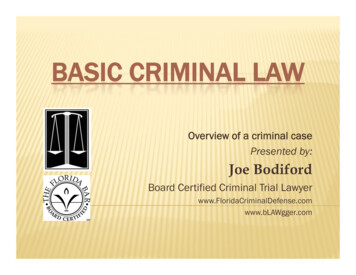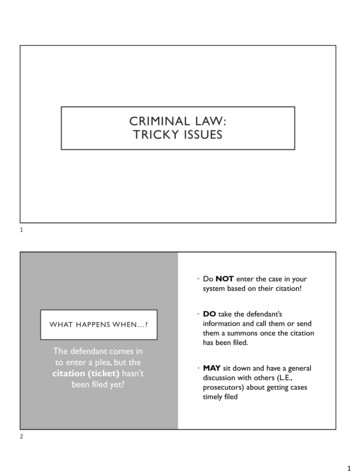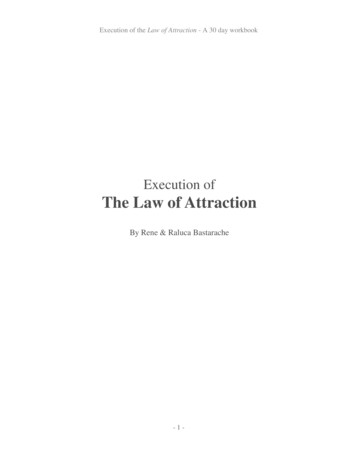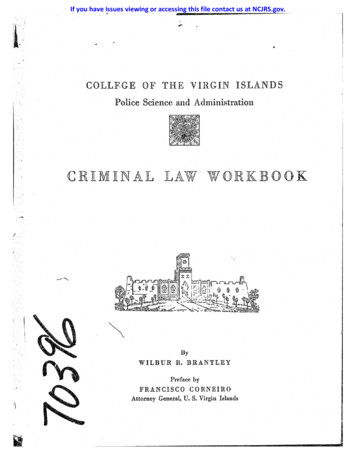
Transcription
If you have issues viewing or accessing this file contact us at NCJRS.gov. ETC. COLLEGE Olr TIlE VIHG-IN ISLANDSPolice Scienee and.Adnlinh trationCRIMINAL LAW WORKBOOK,,ByWILBUR R. BRANTLEYPreface hyFRANCISCO COHNEIROAttorney General, U. S. Virgin Islandsb»,illl
I.AUGCollege of the Virgin IslandsPolice Science and Administration ProgramCRItUNAL LAW WORKBOOKByWilbur R. BrantleyDirectorPolice Science and Administrationwith PrefaceByFrancisco CorneiroAttorney GeneralU.S. Virgin IslandsDX'. John Bacher, ChairmanDivision of Social SciencesCollege of the Virgin IslandsDr. John L. Joy, DirectorContinuing EducationCollege of Virgin IslandsCopyright (c)1968 The College of the Virgin IslandsAll rights reserved.,'
CRIMINAL LAH \!ORKfiUO.KPage iINTRODUCTIONLaw enforcement education at the college level came. to theU.S. Virgin Islands in 1967, provided by a grant from the United StatesDepartment of Justice, Office of Latq Enforcement Ass istance .In developing a curriculum for the course in Criminal Law, the authorsearched available material, local and nation-wide. During this searchit was discovered that the policeman did not have ready access to the lawsoe is required to enforce. This wo kbook, then, was devised to aid himnot only in the claasroom, but in his continuing pursuit of the study oflaw as he grows and develops in his chosen profession.W. R. B.
---- -. !R!HINAL---- . -- --------'--------. ---------, -- ------------------LAH TrlOR1 BOOK,-i 1age i i " ; -PREFAC,!The Task Force Report on the Police issued by the Pt"esidentfsCommission on Law Enforcement notes that cU!'rent police training programsII continue to be a somewhat ft"agmented sporadic, and rather inadequateresponse to the training needs of the field in a day when polico areclonfronted Hith some of the most perplexing social and behavioral problemsw\ have evet" known."Wilbur R. rantley, Dit"ector of Police Science and Administrationat' the College of the Virgin Islands, knows this from years of experience,and has undertaken an ambitious progt"am to update and upgt"ade the policetraining in the light of the requirements of the Virgin Islands community.The Criminal Law Norkbook is an example of the carefully plannedcourses offered to law enforcement c.,fficors and others at the College. Itis to be borne in mind that the partioulat" subjeot is but one of many whichaN or will be available as part of a total tpaining program.However,Hp" Brantley makes clear in his opening matepial on criminal law that histhl:I'llst is to ShOH the law as a basio tool and its relationship to otherfactors within the whole social fabric. The police officer who does nothav'e a firm knowledge in the laws he is requil:'ed to enforce, Mr. Brantleyrightly notes, will be a hindrance to the total effort rather than a usefulinstrument of the government.In the upsurge of urgent concern about crime and the problems ofcrime prevention and control, particular attention has been called to theprimary responsibility borne by loca,l communi ties. The College of theVirgin Islands, through its program of Police Science and Administration isresponding strongly to this local responsibility. Hr. Brantley's wellp'r'epared and well-balanced Criminal Law Workbook is proof of this.Francisco Corne iraAtto'r'ney GeneralDepartment of LawU.S. Virgin Islandsto'.,.
-- ---- --------------CRIHINAL LAW NORl BOOKPage iii-ACKNOWLEOGMENTSThis handbook could not have been prepared without the aid andassistance of many people, too numerous to mention. The fact that somenames at's not mentioned is not meant to dett'act f:t'om the value of theiradvice. To t1r. Francisco Corneiro) Attorney Gener al, U. S. Vil'gin Islands for his unswer\l'ing faith in the belief that the :lob could be done andfor encouraging me to do it. To Messrs. Robet't Ellison and Peter O'Dea,Assistant Attorney Generals, U.S. Virgin Islands, for their continuedencouragement) advice and assistance since the idea was borne, I amdeeply grateful. To the College of the Virgin Islands and specificallyDoctors John Bacher Head of the Depal'tment of Social Sciences andJohn L. Joy, Director of Continuing Education, tot' their support andencouragement by making the time and resources available in order thatthis work could be completed, I am grateful. Lastly and certainly notleast, to my wife Vivian, who bore the brunt of the many lonely nightsand weekends, yet uns'VTervingly continued to encourage my efforts, I amforever grateful.I would like to give special acl nowledgment to Messrs. Fred E. Inbau,James R. Thompson and Claude R. Sowle for the use of their Table of Contents,from Cases and Comments on Cr iminal Justice Volume I, Criminal Law,published by the FoundatiotlPress, Inc. 1968.
TABLB OF CONTBNTS. ". . . . . . , . . . . . . . i ii. . . . . . . " . . . . . . . . . iii.INTRODUCTION . . PJ:mFACE Ae1 .NOWLEDGMENTS .""",ChapterI.History and Development of the Criminal IJaw SystemII.Law A Basic ToolIII.Student's Notes.".-". . . .". .". . . . . . . .Biblj ogt'aphy . . . . . . " · . · . . . . . . . . .' ., .,."" "Appendix ASome Specific Sections of the Virgin Islands Code"179."23. .24
CHAPTER IHISTORY AND DEVELOPMENT OF THE CRIMlNAL LAW SYSTEMThe Evolution of Man MadeCont olsEvery humun being, whethet' man, woman ot' child, must live undet' agiven system of contt'ols.The history of man shows us hON these controlshave evolved from habits and customs to the written law, from the time ofthe cave man to the present day.The interaction of person to person, person to group, group to personand group to group necessitates the adoption and application of certaincontrols.Controls act as guidelines alid establish ol:'der in man f s souieties,limiting certain activities which might infringe on tho rights, persons, orproperties of others. 1Anthropologists in their studies of the lives, habits and customs ofcertain primitive people have found that the regulation of certain controlsin these cultures is established through the TABOO.The taboo, theologicalin nature, imposes upon the group the choice of conforming or the invocationof the wrath of the particular diety offended.The person or persons whoviolate the taboo are punished in a number of ways, either mentai or physical in form.A few examples of physical punishment which brings death tothe offender are burning, drowning, stoning, hanging, disembowling, crucifixion and starvation.Physical punishment does not always end in deathbecause sometimes the offender is merely whipped or maimed, thereafter to bea living" reminder for all to see what happens to those who violate the1William H. McNeill, The Rise of the West: A History of the HumanCommunity, (Chicago and London: University of Chicago Press, 1963),pp. 3-28.
CRIl1INAL LAW VlORKBOOKPage 2tahoo.Mental punishments are more often in the form of suggestions.Signs,symbols and ceremonies ar e used to suggest to the offender that he will bepunished.At times the offender is cast out of the community, he is ostr a-cized and banished by all members of the group.He himself becomes tabooand anyone of the group who associates with him becomes an offender also. 2Throughout history the imposition of punishment has continued to bethere ardof the offender for his violation of controls set forth by theparticular society in which he lives.Present day customs ) with slightvariations, are still similar to those of the primitive and the medieval.Persons found guilty of violating the criminal law toaay can expectphysical or mental punishment or both.Death penalties aremeans of electrocution, hanging or the gas chamber.ca iedout byOffenders are banishedto elaborate institutions of detention and rehabilitation called jails,honor-farms and prisons.Yet upon return to society they are forever cursedas criminals because of the human concept of criminality, that "once acriminal - always a criminal".Under the primitive and tribal systems, the taboos or customs are passed from generation to generation by word of mouth.These taboos and customschange very slowly, and even then depend on the imaginative genius of theelder, chief or council of the tribe.As man realized the need to live wHh his neighbor, families formedtribes and tribes banded together in communal type living.They not onlyshared their gods, but their material products and resources as well.2Adamson, Hoebel, The Law of Primitive Man, (Cambridge, Mass.:Harvard University Press, 1961), pp. 211-254.Mett
- CRIMINAL LAN NCm B00KPage 3 - - - - -. .Controls \-:e1.:'O r 'gul.a:ted th1:'o\!eh th';l 1(h1J f.::Jtnblishetilonger a'".'.s mple5yl'- t of tl"ied m(1tter .Yhave · conside'.'0d th::m as U'iwr,itte.:n laNG handed dpi'ffi il'om one [!(me!'ation toJthe next.the use,Such conh'o13N·:.:;" )adr·q,uat.:;l ns lor.gcon'b.'o. . J.nci r'e ult,i'ion (.1:i" a. expanded and I ",1::'.:J andnClt .onB(:,8they wn,:'e ii'rtended ror hrm\oe·.mouG society) but as civilizationheg':ln to e:-:ploit othel' race:. nnd nc.d:ions,such controls we:L'C (IE li':.:tlf.'. value 3.:1 the reSl.llation 0:: hUl.lan interaction.History againt( 118us that establ.t.:h3d authority in d viI orgclnizations):'ulel' could be f0t111d under the ancio:':1tof Egypt,G!, ec .nduring the'se times thrri: police had their ancient beginningpatrols,gua ds,legions and vigils.nor. e.andIt 'Wasthe fom ofTI1is was the first real tr211sitionfI:"om tribal and clan rule to community rUle.A!'mies at one time tr avf:'llecl only shoI:"t distances to fight, conquer,!'aicl and loot, and then returned home.the OPPoI:"tunity to recuperate.The conquered pec ple woulcl be leftA new Inethod of operationthe history of the Roman Empire, as armies traveledconquering, raiding and 10otiD3,then'r mainingconquered people. .;al:'S lel"ei'X'he spoils of lasfa therobseX'ved inandfClX'ther to gove!'n and rule asent back home with small con .'tingents of' soldie:."s to enSU1 e safe erri val. LF. :After ·the fall. of the ROI:t:!n Empire all eviclence of regulation and ordercit. ,. p . 1'5,·'t. , p. 39;" c.!.
CRWINAL LAW YlORKBOOKpage 4disappeared as barbaric nations fought, invaded and plundeI'ed one another-.It was not until 785 A.D. that a systematic method of contI'ol appeared inthe oapitularies of Charlemagne.These were al genumbeI' of police reg-ulations concerning weights and measures, tolls, markets, the sale. of food,grain and cattle, the burial of the dead, and establishing methods ofhandling circumstances ari.sing out of national disasteI's such as famine andpestilence. SAfter the death of Charlemagne, once again all evidence of civilcontrol was lost in new outbreaks of anarchy.Disorder continued in thispart of the world until the arrival of William the Conqueror.6Prior toWilliam the Conqueror's time, the marauding and destruction had caused manyrefugees to flee and settle in England where they formed tuns.the forerunner of the TOWN as wekno 'l'it today.A TUN isGroups of TENS were knownas a TITHING and ten tithings were known as a HUNDRED.The tribes and clansof the tithings and hundreds were autonomous in their own I'ight.Everytribe or clan was I'esponsible for its members and each member was responsibleto the group.One member was selected each year to act as the chier.effect he was the chief of police and every membeI' was a policeman.InTheduties of the chief were to apprehend criminals, try them and puniSh them.If the criminal escaped, the community was required to make good for allthe damages done to the victim.A warning system was developed to alertall neighbors in the countryside of a wanted cI'iminal.CI'Y, one was obliged to pass it on to the next neighbor. McNeill, op. cit., pp. 444-446.Upon hearing theThus, theGeoI'ge Macaulay Trevelyan, O.M., A ShoI'tened HistoI'Y of England,(London: Longmans, Green and Company, 1944), pp. 89-101.[-
CRIMINAL LAW WORKBOOKPage 5HUE AND CRY and the PRIVATE PERSONS' ARREST came into being,A system of fines was established by a code 'tIThich provided for monetaryrea essin certain cases.a slave.If he wasbe enslaved. omIf the offender could not pay the fine he becameanother tribe and escaped, the entire tribe could8When the Duke of Normandy invaded England, he changed the law enforcementpictu eby placing one of his own officers in charge of the enforce-ment of laws in eachthe Shire being a geographical area equivalentto a county containing seve al hundreds. 9 Local responsibility just seemedI.shi e,to dwindle and disappea as the state assumed mo e and mo e responsibility10for keeping the peace.In the Western world law enforcement for the next eight hundred yearsexperienced somev rytrying times.Crime and violence thrived becauseproper and adequate restraint was lacking.Too often, those persons chargedwith keeping the peace were accessories to crime themselves.Inorde tocombat criminal activity, vigilante groups were organized by law abidingcitizens.A rigorous penal code was adopted by Parliament and one hundredand sixty offenses were made punishable by death.The penal laws wereliterally written in blood, and in one month an average of forty persons aday were hung in London alone. llAt theb ginningof the nineteenth century, many important persons werevery vocal em the subjects of social and economic change.In 1829, Ibid.Ibid.19Ibid. Ibid, p. 98. A. C. German, et. al., Introduction to Law Enforcement and CriminalJustice, (Springfield: C. C. Thomas, 1968), pp. 59-60.
CRIMINAL LAH HORKBOOl Page 6Si Robert Peel, then the ijome Secretary, introduced in Parliament an, ,.nct lhich was the foundation for the establishment of the Meb."Itlpoli tanPolice.Subsequent acts of Parliament and the Statutes of 1839 and 181 0,not only extended the system throughout Great Britain, but also permittedthe formation of a paid couqty.police.,.Si Robert Peel is credited withhaving formulated certain basic principals which were instrumental in laying the foundationfo out" modern .dat! police departments .12.12 Ibid ,. pp. 60-61.
------ ------- - ------ - - .-------- --------.--.,-,--'---'-' -----·'-lCHAPTER IILAW A BASIC TootLaw enforcement officers, and more specifically the modern day policeofficer, is charged with the detection ofprevention of crime.c ime,repression of crime andIn carrying out these responsibilities, which ofnecessity deal w'ith contl'lolling human behavior, the officer finds thatlaw is his basic t09l.irequired toenforce Without a thot'ough knowledge of the laws he isa knowledge of the Criminal Justice System and aboveall a knowledge of the Constitution of the United States, the police officerwill be a hinderance to the total effort rather than a useful instrument ofthe government.This workbook was prepared as an aid to the police.officer/student ofCriminal Law.This wot'kbook is designed to be used in conjunction withthe textbook, Cases and Comments on Ct'iminalLaw, by Inbau, Thompson and Sowle.Justic ,Volume I, CriminalThe appendix to this workbook containsa compilation of some of the penal statutes of the Virgin Islands Code.The police officer/student will learn tee elements of Criminal Law,the definitions and general penalties, laws of arrest, search and seizure,rights and duties of officers and citizens.Scope of the CourseThe course will follow the general outline of the text: l3II1.Outline of Criminal Procedure2.The Legal Concepts of Criminalityl3Fred E. lribau, et. al., Cases and Comments on Criminal Justice,Volume I, Criminal Law, (Mineola: The Foundation Press Inc., 1968).
CR!MINAL LAW 'rfORKBOOl Page' B . 3.Sources of the Criminal Law .4., Constitutional Limitationso the Power of the State toCreate and Define Criminal Offenses. ' - .5.Homicide6.Sex Offenses and Related Problems7.Misappt'cpriation and Related'Offenses8.Criminal Responsibility and the Derense of Mental Impairment9.Uncompleted Criminal Conduct and·Criminal.Combinations. '.'''-';'. ,- .-., .
CHAPTER !I!STUDENT'S NOTES1.Outline of Criminal Procedure'.2.The Legal Concept of Criminality3.Sources of the Criminal LawA.The Common Law.--
LCRIMINAL LAW ylORKBOOt Page 10----------D.Judici l const ctio C.Administ ativeD.Martial,E.AssimilativeF.The Law of NationsRegulationMilita y,C imesi;tnd Tribal Law
mPSI- CRIMINAL LA\v WORKBOOKPage 114.Constitutional Limitation on the Po\vet' of the State to Create and"" D-ef ·n e C r i-m ll-la-1 O f f e-n-s'-e-s----------------- A.Freedom of SpeechB.Freedom of the Press -- the Obscenity I sueC.Freedom of AssociationD.Freedom of Religion
---. ---------.---- . -. -----------------CRIM!NAlG tAW HORKBOOKPage 12' .,E.The Right of PrivacxF.The Right to Bear ArmsG.The Privilege Against Self-Incrimination,IL,
CRIMINAL LAW WORKBOOKPage 13--H.Cruel and Unusual PunishmentI.Due Process of Law(1) The Police Power(2)The Vice VaguenessJ.Equal Protection of the LawsK.The Regulation of Interstate CommerceIIIIIIII'lIIIiIIi
CRIMtNAL LAH HORl BOOK}Sgge lt L.The HaXl POloleXlsM.Immunity of LegislatoXlsN.Bi,ll of Attainder-'.Ir
CRIMINAL LAW WORKBOOKPage 155.HomicideB.Hans laughter.C.Justifiable. D.Excusable;'\.,.
CRutINAL IJAY1 HORKBOOl Page 166.Sex Offenses and Related Problems7.Misapprop iationA.Ir"IL . ,and Related 3)False Pretenses
- --CRIMINAL LAW WORKBOOKPage 17(4)Receiving Stolen Property(5)Robbery(6) Burglary--------------------·------------------ --l
CRIHINAL LMI HORl BOOKPage 18(7) TheTe inologyof Theft:P oblemsofConst uctionI·II,B.RelatedP ope tyIr----------Offenses:A sonand Malicious Mischief
CRIMINAL LAW WORKBOOKPage 198.C iminalA.Responsibility and the Defense of MentalThe Mental Element in(1)Igno anceC imeof Law(2) Mistake of Law and Factrmpai ment
CRIMlNA LAW HORKBOOl Page 20B.Infanc C.DuressD.IntoxicationE.Insanity at Time of Committing,F.Diminished. ResponsibilityG.Incompetency at Time of TrialH.CorporationsPrchibited ,
iiOCRlt·1INAL LAl'1 WORKBOOKPage 219.Uncompleted Criminal Conduot andA.Uncornpl tedCriminal Conduct(1) Attempt(2)Solioitation imlDal·eombinations
CRIMINAL LAW WORKBOOKPage 22B.Criminal Combinations(1)Conspiracy(2)Parties to Crime(3)Organized Crime
BIBLIOGRAPHYAdamson, Hoebel. The Law of Primitive Man.Press, 1961.Cambridge:Harvard UniversityGeI"Illan, A.C., eta al. Introduction to La.w Enforcement and Criminal Justice.Springfield: Charles C. Thomas, 1968.Inbau, Ft'ed E., eta al. Cases and Comment on Ct'l.minal Justice, Volume 1,Ct'iminal Law. Mineola: The Foundation Pt'ess; Inc., 1968.l-1cNeill, William H. The Rise of the vest A History of the Human Community.Chicago: Univet'sity of Chicago Press, 1963.Trevelyan, Geot'ge M. A Shortened Histot'y of England.Gt'een and Company, 19 4.London:Longmans9SUGGESTED READINGDay, Frank D. riminalLaw and Societx.Spt'ingfield:Charles C. Thomas,1964.Dinitz, Simon and Reckless, Walter C. Ct'itical Issues in the Study of Ct'ime:A Book of Readings. Boston: Little, Bt'own and Company, 1968.Donnelly, Richard C.Hart, H. L. A.Ct'iminal Law.The Concept of Law.Heffron, Floyd N.New York:Oxford:F eePt'ess of Glencoe, 1962.Clarendon Press, 1961.Evidence fot' the Patt'olman.Springfield:C. C. Thomas,1958.Housel, Theodore W., and Walset', Guy O.Criminal Cases. New '[ot'k: DennisDefending and Prosecuting Fedet'alCo. Inc., 1956.&Miller, Justin. Handbook of Criminal Law.Publishing Company, 1934. - - - - - - -St. Paul Minnesota:West2&
APPENDIX "AllSomoSE.?cific Sections.of theVir inIslands CodeThis information is not meant to substitute the Virgin Islands Code,but is provided to the student as a ready reference. For a more detailedcoverage of the Penal sections, the student should refer to the VirginIslandS Code.VOLUME II!Title FourteenSection 1. Definition of crime or offenseaA"crime" or "offense" is an act committed or omitted in violation of alaw of the Virgin Islands and punishable by (1) imprisonment; C (2) fine; or(3) removal from office; or(4) disqualification to hold and enjoy any office of honor, trust,orprofit.Section 2. Classification of crimes or offenses(a) Crimes or offenses are divided into felonies and misdemeanors.(b) Not\·dthstanding any Actoof the Legislature to the contrary (1) a felony is a crime or offense which is punishable by imprisonment. for more than one year; and(2) every other crime or offense is a misdemeanor.Section 3. Penalties where penalties not othe lise prescribed(a) Except in cases where a different punishment is prescribed by law (1) every crime or offense declared to be a felony is punishableby imprisonment not exceeding five years; and(2) every crime or offense declared to be a misdemeanor is punishableby a fine not exceeding 200 or by imprisonment not exceedingone year, or by both.(b) When (1) an act or omission is declared by this Code or other law to bea crime or public offense, but without designation thereof aseither a felony or a misdemeanor; and(2) no penalty therefor is prescribed by this Code or other law the act or omission is punishable as a misdemeanor.Section 11. Principals(a) Whoever commits a crime or offense or aids, abets, counsels, commands,induces or procures its commission, is punishable as a principal.(b) Whoever "dllfully causes an act to be done which if directly performedby him or another person "'0uld be a crime or offense is punishableas a principal.(c) Persons within this section shall be prosecuted and tried as principals,and no fact need be alleged in the information against them other thanis required in the information against the principal.
Same Specific Sections of the Virgin IslandsPage 25 odeSection 12. Accessoafter the facta Whoever, knoNing that a crime or offense has been committed, receives,relieves, comforts or assists the offender in order to hindcl." or praventhis apprehension, trial or punishment, is an accessory after the fact.(b) Except as otherwise expressly provided by this Code or any Act of theLegislature, an accessory after the fact shall be imprisoned not morethan one-half the maximum term of imprisonment of fined not more thanone-half the maximum fine prescribed by law for the punishment of theprincipal, or both; or if the principal is punishuble by imprisonmentfor life, the accessory shall be imprisoned not more than t n years.(c) An accessory to the commission of a felony may be pl.'osecutr.'d, triedand punished though the principal may be neither prosecuted nor tried,or though the principal may have been tried and acquitted.Section 13. Misprision of felonyWhoever, having knowledge of the actual commission of a felony, willfullyconceals it from the proper authorities, shall be fined not more thun 500or imprisoned not more than 3 years, or both.Section 14. Capacity to commit crimes or offensesAll persons are capable of committing crimes 0.1"1 offenses except .(1) children under the age of seven years;(2) children over the age of seven years and under th ge of fourteenyears, in the absence of clear proof that at the time: of committingthe act charged against them they knew its wrongfulness;(3) idiots;(4) Persons who are mentally ill and who committed the act chargedagainst them in consequence of such mental illness; and(5) persons who committed the act or made the omission charged underan ignorance or mistake of fact, which disproves any criminalintent.Section 15. Omissions not punishableNo person shall be punished for omitting to perform an act, where suchact has been performed by another person acting in his behalf, and competentby law to perform it.Section 16. IntmdcationNo act committed while in a state of voluntary intoxication' is lesscriminal because c()mmi tted while in such state. However, the court orjury may take into consideration the fact that the accused was intoxicatedat toe time ·in determining the pUrpose, motive' r inte t with hich hecommitted the act whenever the actual existence of any particular purpose,motive, or intent is a necessary element to constitute any particularspecies or degree of crime or offense.Section 17. Conviction on testimony of accompliceNo conviction can be had upon the testimony of an accomplice unless itbe corroborated by such other evidence as tends to connect the efendantwith the commission of the crime. The corroboration is not sufficient ifit merely shows the commission of the crime or the circumstances of thecommission.Section 41. Resistance by party to be inju:t'' cAny person about to be injured may make resistance sufficient to prevent (1) an illegal attempt by force to take or injure property in his
SomaSEecific Sections of, the Virgin Islands CodePage?all'll1 '11lpossession;0%1(2) an offense against his person or his family o some member thereof.!ecti n42.ResistancebX othe EartiesAny perSon, in aid or defense of the person about to be in ured, may makeresistance sUfficient to prevent the orfense.Section 43. Self-defenseThe right of self-defense. does not extend to the infliction of more harmthan is necessary for the purpose of defense. To justify a homioide on theground of self defense, there must be not only the belief but alsoreasonable ground for believing that at the time of killing the deceased,the party killing was in imminent or immediate danger of his life or greatbodily harm.Section 61. PenaltlWhoevel:l, whether under the laws of the Virgin Islands, or of any othet'jurisQictions, or of the United States has been twice convicted ofoffenses, both of which are felonies in the Virgin Islands, shall, uponcon iction of a felony in the Virgin Islands and upon proof of such forme convictions, sentences and committals, be imprisoned fOll a term of not lessthan 10 years, and the maximum thereof shall be the :t' emaindel:' of hisnatural life;Secti.on 62. Pardon effect ofIf any person, liable tq sentence as a habitualof this title, shows to th satisfaction of thefrom imprisonment upon any ro:rmer sentence upongvounds of innocen-se, such cOD;viction, sentence\considered against him."Icriminal under section 61court that he was releaseda pardon granted on theand committal shall not beSection 81. Persons liable to unishmentThe punishment prescribed by thl title shall apply to whoeve (1) commits, in whole or in art, any offense within the Vi gin Islands;01'(2)(3)1\\commits lal:'ceny o robbert outside the Vi gin Islands, and brings)or is found with, the stolen property withing the Virgin Islands; O from outside the Virgin Istands, causes, aids, ad ises orencourages another person to\ ommit an offense within the VirginIslands and is afterwards fou d within the Virgin Islands.Section 82. Crimes commenced outside V gin Islands.When the commission of a crime commenced ithout the Virgin Islands is consummated within its boundaries the defend nt is liable to punishment thereofin the Virgin Islands, although he was out' f the Virt in Islands at the time'of the commission of the crime charged, provided he consummated it in theVirgin Islands through the intervention of n innocent or guilty agent by any means proceeding directly from himsem;.\,Section 83, Place of commission of murder or\manslaughterWhen the crime of murder or manslaughter has b,een committed by means of amortal wound given, or injUl"j inflicted, or po son administered without theVirgin Islands, and the pers 1n so wounded, injured, or poisoned dies thereofwithin the Virgin Islands, tie person committing such crime is liable topunisi1lnent therefor in the V:rgin Islands, and L1 su .!h case the actiontherefor may be commenced an tried in the Virgin Islands.\
Some specific SectionsPage 27o theVirgin ISlands CodeSection 84. Conviction or acquittal outside Virgin IslandsWhen an act declared tob crime is withingth0 jurisdictIon of anyUnited States, State, county, commonwealth ot' territot'ial court in theUni ted States o:r; any of its possessions as VI'ell as of the Vil gin Islands,a conviction or acquittal the:r; eof in the fOl. meI" is a bar to a prosecutiontherefor in the Virgin Islands.Section 9L Sentence foI" te:r m of more th n one yeerA sentence of imprisonm('mt -":1:'02.' any term of more than one year and less thanfor life suspends all the civil rights of the person so sentenced, andforfeits all public officGS and all private trusts) authot'ity, or power dduring such imp:r isonment.Section 92. Sentence for lifeWhoever is sentenced to imprisonment for life is thereafter deemed civillydead.Section 101. Penalty for vio1 tion of regulationsWhoever violates any regulatiol -issued under authority of law for whichno other penalty is provided shall be fined not more than 20 or imprisonednot more than 30 days or both.Section 102. Civil remediesThe omission to specify or affirm in this Code any liability for anydamages, penalty, or forfeiture, or other remedy imposed by law and allowedto be recovered in a civil action, for any act or omission declared to bepunishable as a crime, does not affect any right to recover Ol' enforcesuch l:"emedy.Section 103. Forfeiture of propel'tyNo conviction of any person for crime works any f01:'feiture of any property,except in cases in which a forfeiture is expressly imposed by law.Section 104. Act or omission punishable under ifferent provisionsAn act or omission which is made punishable in different ways by differ'entprOVisions of this Code may be punished under any of such provisions, butin no case may it be punished under more than one. An acquittal or conviction and sentence under anyone bars a prosecution for the same act oromission under any other.Section 121. For purposes of gambling or prostitutionHhoever, through invitation or device, prevails upon any person to visitany room, building, or other places kept for the purpose of gambling orprostitution, shall be imp1:'isoned not more than 5 years.Section 151. Procuring miscarriageWhoever provides, supplies, or administers to any pregnant woman, 01:'procures any such woman to take any medicine, drug or substance, or usesor employs
Law enforcement education at the college level came. to the U.S. Virgin Islands in 1967, provided by a grant from the United States Department of Justice, Office of Latq Enforcement Ass istance . In developing a curriculum for the course in Criminal Law, the a
